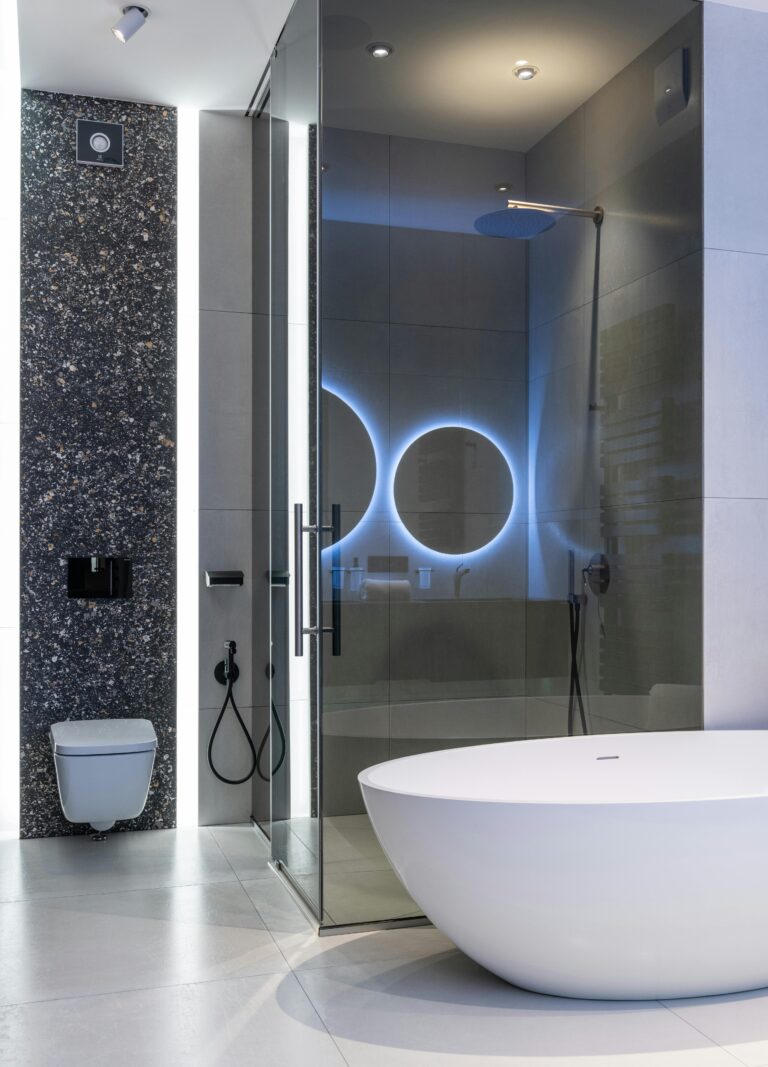Imagine a day without access to clean water. No water to drink, cook, or wash.
Now, imagine living this way every day.
This is the harsh reality for billions of people around the world who lack access to clean water and sanitation services. But amidst this global crisis, there are organizations like Maji na Ufanisi (MnU) that are making a difference.
MnU is dedicated to providing water, sanitation, and hygiene services to those who need them most.
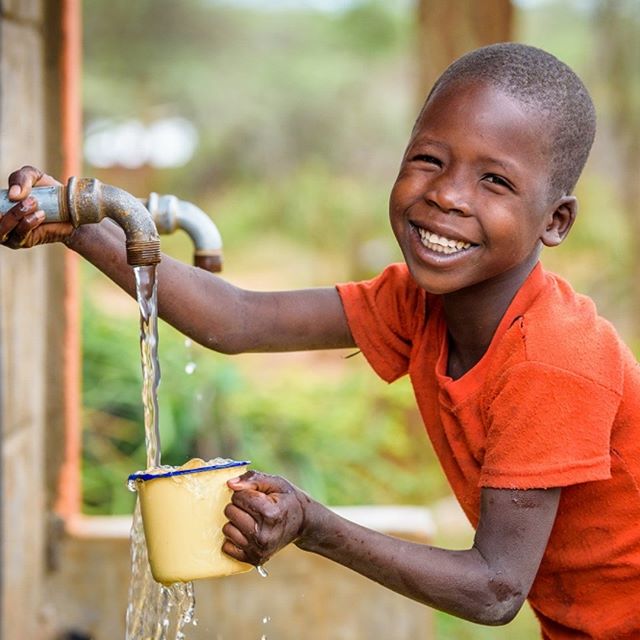
The Plight of Urban Settlements
According to the United Nations, 2.2 billion people around the world do not have safely managed drinking water services, and 4.2 billion people do not have safely managed sanitation services. These numbers are staggering, aren’t they?
The situation is even more dire in informal settlements, where poor sanitation and lack of clean water are part of daily life.
The SDG 6 Goals
The United Nations established Sustainable Development Goal 6 (SDG 6) in response to this global crisis. SDG 6 aims to ensure the availability and sustainable management of water and sanitation for all by 2030.
But despite progress, we still have a long way to go, especially in regions like Africa. In urban slums like Kibera, Mathare, and Kongowea, the challenge is even more pronounced.
The lack of clean water and sanitation services is a daily struggle for residents. Achieving SDG 6 isn’t just about providing services; it’s about transforming these communities and ensuring a healthier, more sustainable future for all.
Also read: SDG 6: Clean Water and Sanitation – A Comprehensive Guide for Change-Makers
The Situation in Kenya: A Battle for Water and Sanitation
In the heart of Africa, Kenya, a country known for its diverse wildlife and breathtaking landscapes, faces a less picturesque reality.
The struggle to access clean water and sanitation services is a daily ordeal for many Kenyans, particularly those living in urban settlements and public markets.
According to UN-Water, as of 2021, approximately 32% of Kenyans still lack access to safe water, and over 70% of Kenya’s urban population resides in informal settlements, where access to clean water and sanitation services is often limited or non-existent. These statistics are not just numbers; they represent the harsh reality of millions of people.
The lack of clean water and proper sanitation facilities has severe implications in these informal settlements. It’s not just about the inconvenience; it’s about the risk of waterborne diseases, the impact on education as children miss school due to illness, and the countless hours spent collecting water instead of pursuing economic activities.
But amidst these challenges, there’s a beacon of hope.
Organizations like Maji na Ufanisi (MnU) are stepping up to make a difference. MnU is not just another organization; it’s a movement dedicated to transforming lives by improving access to water, sanitation, and hygiene services.
They’re working tirelessly in some of the most challenging environments, bringing sustainable solutions to communities that need them the most.
Maji na Ufanisi, which translates to ‘Water and Development’ has been at the forefront of the battle against water and sanitation issues in Kenya since 1997. Their innovative and replicable approaches to water, sanitation, and hygiene services have successfully challenged urban settlements and public markets.
What sets MnU apart is their “maintenance-free” sanitation infrastructure, which is run by organized youth and women groups with minimal administrative support or subsidy from County Governments.
This approach ensures the projects’ sustainability and fosters a sense of ownership and responsibility within the community.
In the face of adversity, MnU’s work in Kenya is a testament to the power of innovation, community involvement, and relentless dedication. Their efforts are not just improving access to clean water and sanitation but transforming communities and changing lives.
And in the process, they’re showing us that change is possible even in the face of daunting challenges.
Also read: The Fight for the Human Right to Water: Stories from the Frontlines
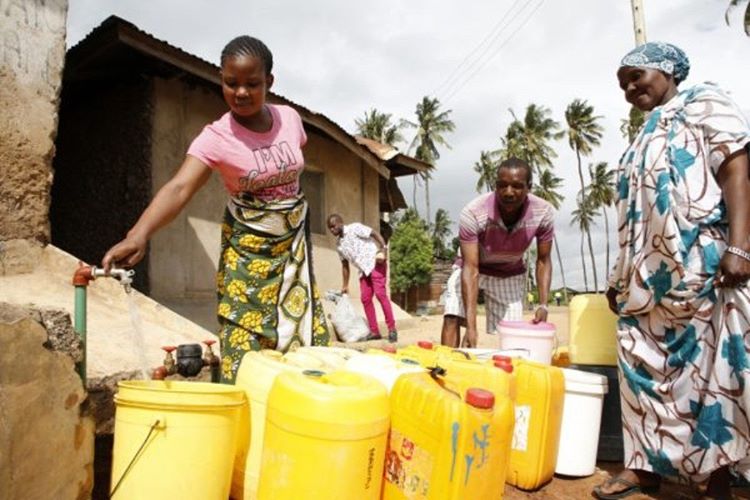
Maji na Ufanisi: Pioneering Change
In the realm of water, sanitation, and hygiene services, Maji na Ufanisi (MnU) stands as a beacon of innovation and resilience.
Their work, primarily focused on the challenging environments of urban settlements and public markets, has been marked by remarkable success. But what truly sets MnU apart is their unique approach to these complex issues.
MnU’s innovative and replicable model is a testament to their commitment to sustainable solutions.
They’ve developed a “maintenance-free” sanitation infrastructure, a concept that may seem counterintuitive at first. After all, how can something as essential as sanitation be maintenance-free?
The answer lies in MnU’s community-centric approach. Instead of relying on external entities for maintenance, MnU entrusts the responsibility to organized youth and women groups within the community.
These groups run the sanitation infrastructure with minimal administrative support or subsidy from County Governments. This approach ensures the projects’ sustainability and fosters a sense of ownership and responsibility within the community.
This model is not just about providing sanitation services; it’s about empowering communities. By involving local youth and women groups in the management of these facilities, MnU is providing them with valuable skills and employment opportunities.
This not only improves their livelihoods but also contributes to the community’s overall development.
Moreover, this approach has a ripple effect. The youth and women involved in these projects become role models in their communities, inspiring others to participate in similar initiatives. This creates a cycle of empowerment and development that extends far beyond the initial project.
MnU’s work is a shining example of how innovative thinking and community involvement can transform the way we approach global issues.
Their “maintenance-free” sanitation infrastructure is more than just a solution to a problem; it catalyzes change, driving community development and empowerment.
Through their work, Maji na Ufanisi is not just changing the landscape of water, sanitation, and hygiene services; they’re changing lives.
They’re showing us that we can overcome even the most daunting challenges with the right approach. And in doing so, they’re paving the way for a future where everyone has access to clean water and sanitation, regardless of where they live or their economic status.
A Sustainable Model: Empowering Communities and Transforming Lives
Maji na Ufanisi’s (MnU) approach to water, sanitation, and hygiene services goes beyond the traditional model. They’ve created a sustainable enterprise model that not only addresses the immediate needs of the community but also fosters long-term development and growth.
These enterprises, managed by local youth and women groups, are self-sustaining. They cover their utilities and operational costs through the revenues they generate. But the benefits don’t stop there.
Any profits made are reinvested back into the community, specifically in educating and training People with Disabilities. This investment is a powerful tool for social change, providing individuals with the skills and knowledge they need to improve their lives and contribute to their communities.
Moreover, these enterprises create formal employment opportunities for the youth. In regions like the Coast region of Kenya, where incidents of radicalization have been a concern, these opportunities are invaluable.
They provide the youth with a constructive and rewarding way to contribute to their communities, reducing the allure of radicalization and promoting peace and stability.
But the impact of this sustainable model extends even further. By providing access to critical services like clean water and sanitation, these enterprises are improving the health and well-being of the entire community.
They’re reducing the incidence of waterborne diseases and improving overall hygiene, leading to healthier, more productive communities.
Furthermore, by promoting social inclusion, these enterprises are helping to build stronger, more cohesive communities. They’re breaking down barriers and fostering a sense of unity and shared responsibility.
This social cohesion is essential for these communities’ long-term development and prosperity.
MnU’s sustainable model is not just a solution to a problem; it’s a catalyst for positive change. It’s a model that empowers communities, promotes social inclusion, and contributes to the overall development of local communities.
It’s a model that proves that with the right approach, we can turn challenges into opportunities for growth and development. And in doing so, we can create a better, more sustainable future for all.
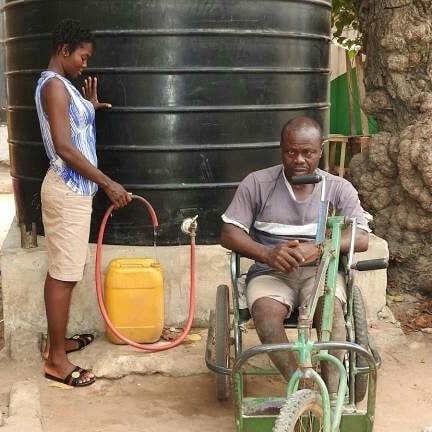
Partnering for Success
By partnering with MnU, County Governments can benefit from their experience and expertise in implementing sustainable and profitable WASH projects.
MnU’s model not only provides access to critical services but also creates employment opportunities, promotes social inclusion, and contributes to the overall development of local communities.
MnU works with various community-based organizations (CBOs) that manage the facilities using the pay-per-use system.
Also read: What is the Maji na Ufanisi WASH Entrepreneurial Model, and How has it Been Implemented in Kenya?
The Water, Sanitation, and Hygiene Enterprise Model (WASHEM)
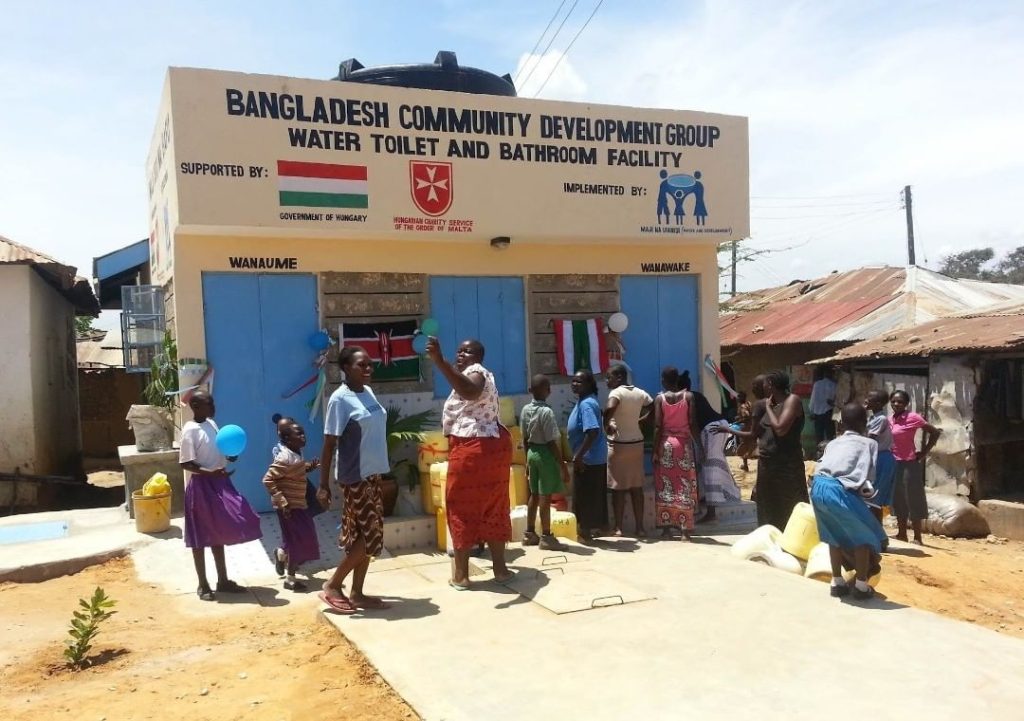
In the heart of Mombasa County’s Kongowea market, Maji na Ufanisi (MnU) piloted a revolutionary approach to sanitation: the Water, Sanitation, and Hygiene Enterprise Model (WASHEM).
This wasn’t just a project but a bold step towards a sustainable solution for the sanitation crisis in urban settlements.
The WASHEM model began with rehabilitating 60 public toilets, a critical need in a bustling market serving thousands of people daily. But MnU didn’t stop at merely restoring these facilities.
They redesigned them to be disability-friendly, ensuring that everyone could access clean and safe sanitation services regardless of physical ability. This inclusive approach is a testament to MnU’s commitment to leaving no one behind in the quest for universal sanitation.
Empowering the Youth
But the real innovation of WASHEM lies in its management model. Instead of relying on external maintenance, these facilities were handed over to local youth groups for management.
This approach not only ensures the sustainability of the project but also empowers the local community. It provides the youth with a sense of ownership and responsibility, and more importantly, it offers them a source of income and a chance to contribute positively to their community.
The WASHEM model is more than a sanitation project; it catalyzes social and economic transformation. It’s a model that proves that with the right approach, we can turn challenges into opportunities for growth and development.
Recognition and Impact
MnU’s work has not gone unnoticed. In May 2015, their project in Kongowea public market was rated first out of over 900 projects that had been competing for an international award given by AMCOW (African Ministers’ Council on Water) and UNICEF.
This recognition is a testament to the effectiveness and impact of the WASHEM model.
But the real impact of MnU’s work is seen in the lives of the people they serve. Over 100,000 people have benefited from improved WASH services, and 10,000 women and youth have directly benefited from employment at these public sanitation facilities.
These numbers represent people whose lives have been transformed through clean water and sanitation access.
Collaborations with County Governments
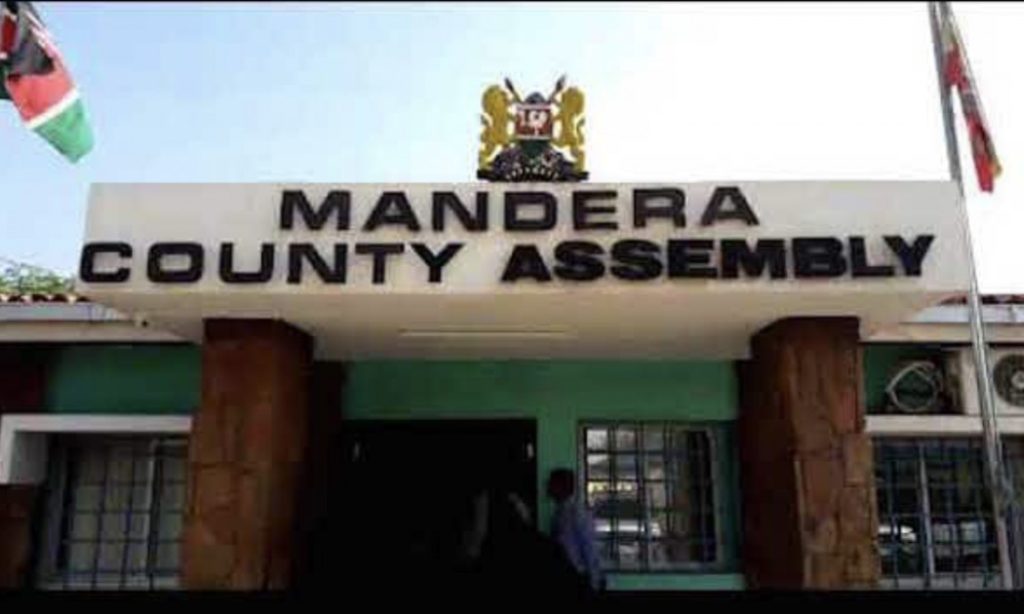
Maji na Ufanisi has Memorandums of Understanding (MOUs) with several county Governments. These collaborations are aimed at improving water, sanitation, and hygiene services in these regions.
These collaborations are a testament to these governments’ trust and confidence in MnU’s work.
Also read: Maji na Ufanisi and Wajir County Sign MOU for Joint Venture to Improve WASH Conditions
Your Role in This Journey
Now, you might be wondering, “How can I contribute to this cause?” The good news is, there are several ways you can help.
You can donate to MnU, volunteer your time, or even spread the word about their work. Every little bit helps.
Remember, your contribution can make a significant difference in someone’s life. It can provide them with access to clean water, improve their health, and even create employment opportunities. Isn’t that a cause worth supporting?
The global water and sanitation crisis is a daunting challenge, but we can make a difference with organizations like Maji na Ufanisi and people like you. By supporting MnU, you’re not just donating to a cause but investing in a better future for thousands of people.
So, are you ready to join us in creating a better future for everyone?
Together, we can transform lives and create a better world for future generations.
The journey to clean water and sanitation for all is not easy. It’s a path filled with obstacles and challenges. But it’s also a journey filled with hope and potential.
Every step we take brings us closer to a world where everyone, regardless of where they live, has access to clean water and sanitation. It’s a world worth fighting for.
So, let’s take that step together. Let’s support the work of Maji na Ufanisi and help them bring clean water and sanitation to those who need it most. Let’s make a difference, one drop at a time. Because every drop counts, and together, we can create an ocean of change.
Remember, your contribution can make a world of difference. So, let’s get started. Let’s make a difference together.
In the words of Mahatma Gandhi, “Be the change you wish to see in the world.” Let’s be that change. Let’s create a world where everyone can access clean water and sanitation. Because everyone deserves a chance to live a healthy and dignified life. And together, we can make that dream a reality.
FAQs
1.What is Maji na Ufanisi’s mission?
Maji na Ufanisi (MnU) is dedicated to providing water, sanitation, and hygiene services to those who need them most, particularly in challenging urban settlements and public markets.
2.What is the United Nations’ Sustainable Development Goal 6 (SDG 6)?
SDG 6 is a global commitment to ensure everyone can access water and sanitation by 2030. It aims to achieve universal and equitable access to safe and affordable drinking water and adequate sanitation and hygiene for all.
3.What is the sanitation situation in Kenya?
In Kenya, many people lack access to clean water and sanitation services, especially in urban settlements and public markets. However, organizations like Maji na Ufanisi (MnU) are working to address these challenges.
4.What sets Maji na Ufanisi apart in their approach to sanitation?
MnU has developed a “maintenance-free” sanitation infrastructure run by organized youth and women groups within the community. These groups manage the sanitation facilities with minimal administrative support or subsidy from County Governments, ensuring the sustainability of the projects.
5.What is the Water, Sanitation and Hygiene Enterprise Model (WASHEM)?
WASHEM is a model developed by MnU that involves the rehabilitation of public toilets and their management by local youth groups. The model ensures the sustainability of the sanitation facilities and provides employment opportunities for the youth.
6.How does the WASHEM model empower the youth?
The WASHEM model gives the youth a sense of ownership and responsibility over the sanitation facilities. It also offers them a source of income and a chance to contribute positively to their community.
7.What impact has Maji na Ufanisi’s work had so far?
MnU’s work has benefited over 100,000 people with improved WASH services, and over 10,000 women and youth have directly benefited from employment at these public sanitation facilities. Their project in Kongowea public market was also rated first out of over 900 projects in an international competition.
8.Who are Maji na Ufanisi’s partners?
MnU works with various community-based organizations (CBOs) and has Memorandums of Understanding (MOUs) with several County Governments in Kenya. These partnerships help improve these regions’ water, sanitation, and hygiene services.
9.How can I contribute to Maji na Ufanisi’s mission?
You can contribute to MnU’s mission in several ways, including donating to MnU, volunteering your time, or spreading the word about their work.
10.What is the ultimate goal of Maji na Ufanisi’s work?
The ultimate goal of MnU’s work is to create a world where everyone has access to clean water and sanitation regardless of where they live or their economic status. They aim to transform lives and create a more sustainable future for all.


